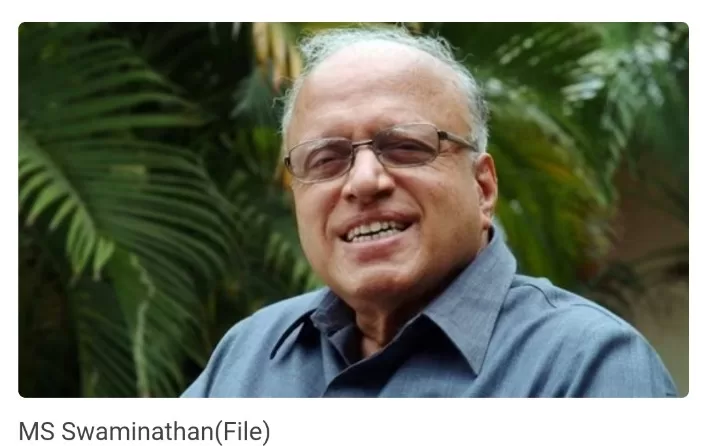Chennai- In a somber turn of events, Mankombu Sambasivan Swaminathan, often hailed as the visionary force behind India’s transformative ‘Green Revolution,’ has passed away at the venerable age of 98 in Chennai.
Born on August 7, 1925, in Tamil Nadu’s Thanjavur district, Dr. Swaminathan’s illustrious career encompassed roles as an agronomist, agricultural scientist, plant geneticist, administrator, and philanthropist. His pivotal contribution lay in the pioneering development of high-yielding strains of paddy, a pivotal boon to India’s economically challenged farming communities, catalyzing greater agricultural yields.
Swaminathan embarked on his professional journey in 1949, dedicatedly delving into genetic research of pivotal crops such as potato, wheat, rice, and jute. It was a pivotal juncture in India’s history, teetering on the brink of a catastrophic famine with a looming food grain shortage. Swaminathan, alongside luminaries like Norman Borlaug and a cadre of fellow scientists, orchestrated the creation of high-yield wheat seeds, fundamentally reshaping the agricultural landscape.
Distinguished as the “Father of Economic Ecology” by the United Nations Environment Programme, Swaminathan collaborated extensively with stalwart agricultural ministers of the 1960s and 70s, including C Subramaniam and Jagjivan Ram, in championing the ‘Green Revolution.’ This initiative, rooted in the embrace of cutting-edge chemical and biological technology, catalyzed an unprecedented surge in wheat and rice productivity.
For his pioneering role in the introduction of high-yield wheat and rice strains into India, Swaminathan received the inaugural World Food Prize in 1987. Subsequently, he founded the MS Swaminathan Research Foundation in Chennai. His accolades extended to the Ramon Magsaysay Award in 1971 and the Albert Einstein World Science Award in 1986.
Swaminathan’s illustrious career further bore the imprints of prestigious honors, including the Padma Shri, Padma Bhushan, and the Padma Vibhushan. His contributions merited the H K Firodia award, the Lal Bahadur Shastri National Award, and the Indira Gandhi Prize.
This distinguished Indian agriculturist held administrative roles within various agricultural research laboratories, including his tenure as the director general of the Indian Council of Agricultural Research and the International Rice Research Institute. He also assumed the pivotal role of principal secretary for the Ministry of Agriculture in 1979.
In 1988, Swaminathan ascended to the presidency of the International Union for the Conservation of Nature and Natural Resources. In 2004, he was entrusted with the mantle of chairing the National Commission on Farmers.
Beyond his monumental impact within India, Swaminathan transcended national borders, significantly contributing to international agricultural and environmental initiatives. His influence was immortalized when Time magazine recognized him as one of the 20 most influential Asians of the 20th century.
Dr. Swaminathan leaves behind a legacy that continues to inspire and enrich the world of agriculture. He is survived by his three daughters: Soumya, Madhura, and Nitya. His wife, Mina, sadly departed in 2022.




